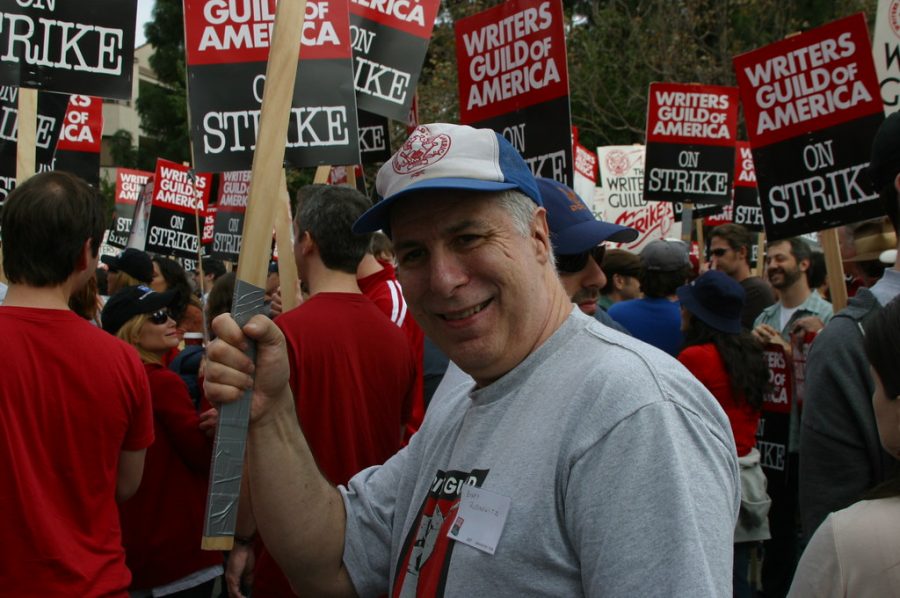Negotiations fail: Writers Guild of America goes on strike for the first time in over a decade
Writers Guild striking in front of Fox News during the 2007-2008 strike
May 29, 2023
Television and film writers have gone on strike after failing to reach a new contract. It has been a little over a decade since the Writers Guild of America (WGA)’s last strike in 2007-2008, yet the film and TV industry looks drastically different since then.
The last strike lasted 100 days, engendering a mass recession for the state as its economy lost 2.2 billion dollars. Nicole Kassel, Masters parent ‘22 ‘26 and film director, entered the industry a few years before that strike. “When I was entering [the industry] independent film was thriving. Television was very different, there was a rise in what we now call the ‘golden age ‘of television,” Kassel said. The current strike mirrors similar circumstances as those in 2008, as writers have been embroiled by economic and technological uncertainty. Every three years, the WGA negotiates a new contract with the Alliance of Motion Picture and Television Producers, comprising Apple, Amazon, Apple, Disney, Warner Bros. Discovery, NBC Universal, Netflix, Paramount and Sony.
Currently, the (WGA) is demanding increases in payment, residual pay, and protection from AI. The Alliance of Motion Picture and Television producers hopes to “Reach a deal that is mutually beneficial to writers and the health and longevity of the industry.” Over the past four years, as streaming services such as Netflix, Disney+, Hulu, and Amazon Prime produce thousands of new shows, companies have been pressured into investing millions into individual episodes to gain an advantage over their competition. As a result, the amount of money circulating for wage increases has remained stagnant. And, factoring in inflation, the median wage for screenwriters has decreased 14%.
In recent years, starker disparities in terms of income between broadcast writers and streaming writers have emerged. Writers paid by streaming companies lack the safeguarded incomes of broadcast writers, because they are not protected by syndication (selling something for publication or broadcast directly to multiple outlets) or residuals (payments made to writers from reruns that are funded by commercials on networks).
In tandem with the shrinking attention spans of Americans, the number of weeks that writers are employed have also decreased. Traditionally, sitcoms such as Friends usually included at least 20 episodes per season, keeping writers employed for 10–12 months per year, but with the rise of mass streaming and competition from other networks, the number of episodes per season has shrunk. For example, the eight episode second season of the hit HBO MAX original series White Lotus took only 10 weeks to write.
Additionally, concerns over the number of writers hired for shows are circulating as the implementation of “mini-rooms” made up of fewer writers than have traditionally been used, have prevented TV writers from profiting off of popular shows. Because shows like White Lotus are written entirely by their creators, writers claim that there is little room for a source of income. “You can’t just have one person write every single episode, or you are going to clean out the middle class,” said Peter Ackerman, American actor, playwright, screenwriter, television writer, television producer, author and member of the WGA,“You have to have multiple jobs a year now that [shows] are getting shorter and shorter, so writers are getting panicky.” In response, the WGA proposed a hiring quota to mitigate this issue, which studios struck down as “incompatible with the creative nature of our industry.”
“You can’t just have one person write every single episode, or you are going to clean out the middle class, — Peter Ackerman
For some, the strike is raising questions about the future of Hollywood. Ackerman said, “My older son is a junior in college studying film, and I can’t quite picture what the industry is going to look like.” Junior and aspiring director, Toby Freedman, is worried about how the present moment will impact film students’ future.“I think that the writers’ strike is a good thing, because once over, it will ensure quality scripts for the future of Hollywood. A lot of what they want would be great for the industry, but as it stands, the strike is problematic for the entire film community, especially film students looking for internships,” Freedman said.
Contributing to more widespread panic are worries of AI replacing industry workers, ranging from truck drivers, to writers. “Are we all just going to want to watch television shows that are made by computers? It’s really weird, but it’s very threatening to us because they are becoming better and better,” said Ackerman. Because first drafts can make up a significant portion of a writer’s pay, AI could potentially eliminate the rudiments of the writing process.To combat this, the WGA is currently advocating for bans on studio usage of AI for first drafts and rewrites.
The Teamsters union, America’s largest union comprising freight drivers and warehouse workers, have supported the WGA as they too could be impacted by a heightened use of AI in Hollywood. 12,000 Teamsters belong to the Motion picture and Theatrical Trade Division, so if developments were to be made for self-driving trucks, large segments of Teamsters could lose their jobs.
Ackerman hopes for a more equitable future. “We all know that we are not going to achieve all of our demands, but we are hoping that we get a little bit better salaries, a little tinier piece of the pie, what we are asking for the whole union of 12,000 members is literally less than 2% of the industry profits, we just want to be able to sustain our careers.”




























